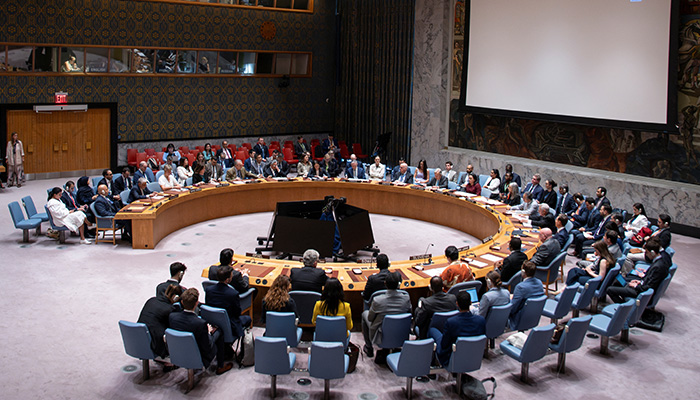
Pakistan, China and Russia have jointly appealed for an immediate halt to hostilities in the Middle East, pushing for the United Nations Security Council (UNSC) to pass a resolution demanding an unconditional ceasefire in the region.
The conflict intensified sharply following a major development as the United States claimed it had destroyed critical Iranian nuclear facilities in a preemptive strike to stop the country’s suspected nuclear ambitions, marking the most significant Western military intervention against Iran since the 1979 Islamic Revolution, carried out in coordination with Israeli forces.
UN Secretary-General Antonio Guterres, while speaking at yesterday’s UN Security Council meeting, said that the bombing of Iranian nuclear facilities by the US “marks a perilous turn”.
As the world awaited Iran’s response to the US strikes, the UNSC met to discuss the development on Tehran’s request while it rained down missiles on Israel despite Trump’s warning of “far greater” consequences if the hostilities don’t stop.
China and Russia condemned the US strikes while Pakistan backed Tehran and its right of self-defence, citing a violation of international law.
The UN chief said there must be an immediate ceasefire and a return to “serious, sustained negotiations.”
“The people of the region cannot endure another cycle of destruction. And yet, we now risk descending into a rathole of retaliation after retaliation,” he told the 15-member Council.
Iran’s UN Ambassador Amir Saeid Iravani accused Israel and the US of destroying diplomacy, said all US allegations are unfounded and that the nuclear non-proliferation treaty “has been manipulated into a political weapon.”
“Instead of guaranteeing parties’ legitimate rights to peaceful nuclear energy, it has been exploited as a pretext for aggression and unlawful action that jeopardise the supreme interests of my country,” Iravani told the council.
Meanwhile, Israel’s UN Ambassador Danny Danon praised the US for taking action against Iran.
“This is what the last line of defense looks like when every other line has failed.” He accused Iran of using negotiations over its nuclear programme as camouflage to buy time to build missiles and enrich uranium.
“The cost of inaction would have been catastrophic. A nuclear Iran would have been a death sentence just as much for you as it would have been for us,” he told the council.
‘Grave threat to safety’
Speaking at the 15-member body, Pakistan’s Permanent Representative to the UN Asim Iftikhar said that history reflects that the use of force and unilateral military actions only deepen conflicts and entrench divisions.
“We must act now to prevent the situation from spiralling further out of control [….] Dialogue and diplomacy remain the only viable path forward,” Pakistan’s Permanent Representative to the UN Asim Iftikhar told the UNSC huddle amid increasingly volatile situation in the region.
Ambassador Iftikhar echoed the earlier statement issued by the Foreign Office condemning US bombings and backing Iran’s right of self-defence and lamented the attacks on the nuclear sites as “dangerous precedent and pose a grave threat to the safety and security of populations across the region and the world”.
Denouncing the attacks on IAEA-safeguarded facilities, the envoy said that Islamabad has joined China and Russia in circulating a draft resolution calling for an “immediate and unconditional ceasefire”.
The resolution also urges “all parties to refrain from further escalation; demands the urgent protection of civilians and civilian infrastructure; and supports a diplomatic path forward on the Iranian nuclear issue that is acceptable to all parties”.
Reiterating Pakistan’s support for Iran, the UN representative underscored that the sharp rise in tensions and violence as a result of the Israeli aggression and unlawful actions was profoundly disturbing and “any further escalation risks catastrophic consequences for the region and beyond”.
China, Russia condemn US intervention
Condemning the US strikes, China’s UN Ambassador Fu Cong voiced a similar stance that peace in the Middle East cannot be achieved by the use of force.
“Diplomatic means to address the Iranian nuclear issue haven’t been exhausted, and there’s still hope for a peaceful solution,” he added.
Meanwhile, Russia’s UN Ambassador Vassily Nebenzia recalled former US Secretary of State Colin Powell making the case at the UN Security Council in 2003 that Iraqi President Saddam Hussein constituted an imminent danger to the world because of the country’s stockpiles of chemical and biological weapons.
“Again we’re being asked to believe the US’s fairy tales, to once again inflict suffering on millions of people living in the Middle East. This cements our conviction that history has taught our US colleagues nothing,” he said.
While, it was not immediately clear when the council could vote on the draft resolution, the three countries have asked council members to share their comments by Monday evening. A resolution needs at least nine votes in favour and no vetoes by the US, France, Britain, Russia or China to pass.
The US is likely to oppose the draft resolution which also condemns attacks on Iran’s nuclear sites and facilities. The text does not name the United States or Israel.
Since the attack on its nuclear facilities, the Iranian parliament has backed the move to block the Strait of Hormuz — the world’s key trade passageway.
Iran has slammed the US for sabotaging ongoing diplomatic efforts with its strikes while urging the international community to take a clear stance, saying “global norms and diplomacy are under direct threat”.
“We were in the middle of negotiations,” FM Araghchi said. “It was not Iran that walked away. The US abandoned diplomacy with missiles, not words,” Iranian Foreign Minister Abbas Araghchi said during a press conference during the Organisation of Islamic Cooperation (OIC) summit in Istanbul on Sunday.
— Additional input from Reuters












